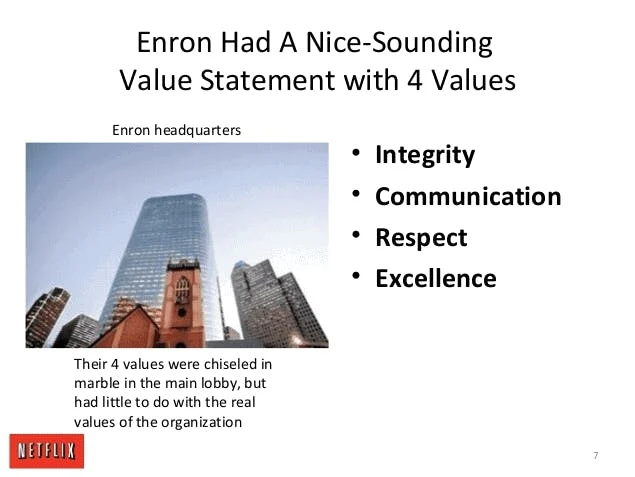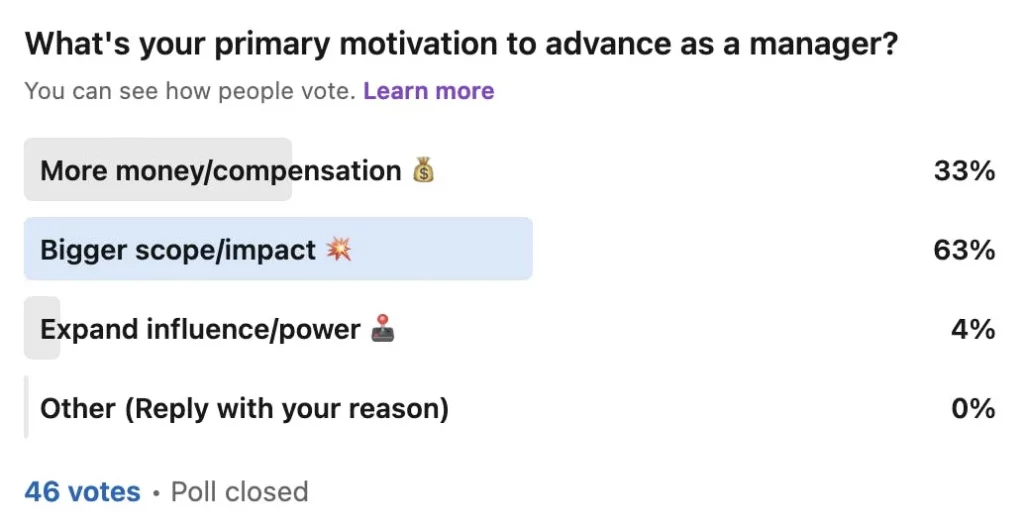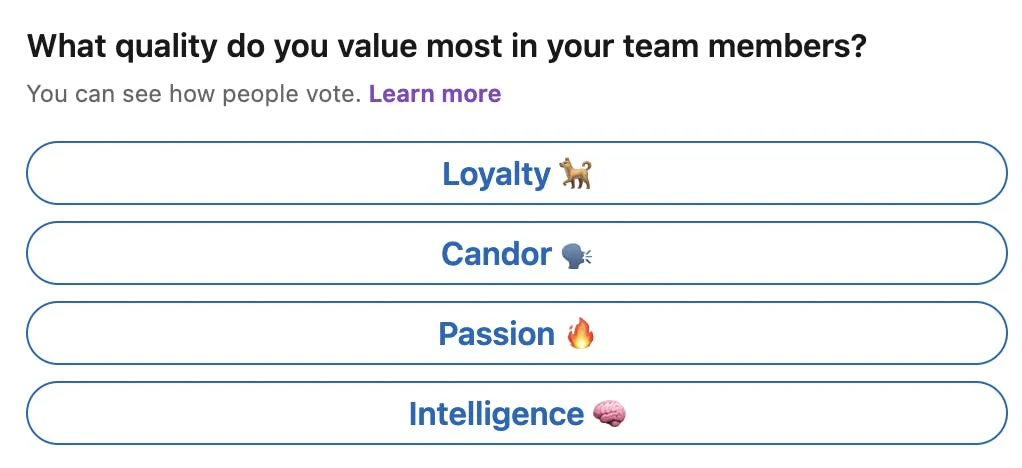In today’s edition, we cover an age old question of how toxic people rise in organizations so often, look at how to really define integrity in a way that's clear to everyone, check in on the possibility of a Lighthouse Leadership community starting, and ask you what you value most.
Let’s dive in…
Table of contents:
- 🥘 Food for Thought on Why Toxic Leaders get Promoted
- 🪞 Leadership Reflections on What is Integrity?
- ❓ Poll of the Week on What You Value Most
➡️ Did a friend forward this to you? Get every issue straight to your inbox by signing up here.
Note: This is a preview of our weekly leadership newsletter, Lighthouse Leadership Weekly (LLW).
To get this sent to your inbox every week, along with our latest long form essays on this blog, you can sign up here.

🥘 Food for Thought
"We have a million and one metrics to measure someone's performance and negligible to no metrics to measure someone's trustworthiness.
And so what we end up doing is promoting or bonusing toxicity in our businesses, which is bad for the long game because it eventually destroys the whole organization." - Simon Sinek, bestselling author, leadership expert, and TED speaker.
To be honest, I find some of Simon Sinek's work a bit too preach-y and fortune cookie like, but this one is really spot on.
I came across it in my Twitter feed this week and felt like we should definitely explore it:
Why toxic leaders get promoted pic.twitter.com/5StL6gAqyz
— Hiten Shah (@hnshah) September 20, 2024
What do you measure?
It's a great question to reflect on. It's a lot easier to manage the things that you take the time to measure, which is why so many teams have those kinds of metrics:
- Sales: The most metric-driven of them all, will often measure not just quota/revenue driven, but calls made, emails sent, and every step in a pipeline.
- Marketing: While some marketing is hard to measure (like word of mouth, or podcast impact), marketing qualified leads, website traffic, and fans and followers all get measured.
- Customer Success/Support: It's common to measure key metrics like time to response, # of tickets resolved, customer satisfaction, and time to resolution.
- Engineering: It's always a struggle to measure engineering output, but it doesn't mean companies don't try to measure things like "velocity", # of tickets completed, PRs made, and many others that can be gamed.
Yet, despite all these measures, and attempted measures, as Sinek rightly points out, there isn't any measure of trust, respect, or likeability.
Is it any surprise then that we often promote people that are fantastic on a measure of output, but are toxic in any number of other ways?
Why we don't measure these things.
Some of what we measure is based on what is easy to measure. And that really applies here.
There isn't really an agreed upon metric of "trust" or "is this person a jerk?".
Yes, you can do 360 reviews, and at times that's really helpful, but it can also be a problem.
When companies get really into 360s, a bunch of problems emerge:
- The number of reviews to complete quickly explodes for each person.
- Each review starts to have the number of questions balloon as everyone tries to squeeze in more insights.
- People stop taking them seriously due to 1+2
And whether you do a 360, or get the feedback another way (skip level 1 on 1s can help), to some extent, it's all subjective.
While Sinek creates a hypothetical chart of how trustworthy vs. how skilled someone is, I don't know how you mark someone a 7/10 on trust, and another 10/10.
I think it's actually more binary. You are, or you are not.
Ironically, at the end of the clip, Sinek seems to agree when he says:
"...it's unbelievably easy to find these people. Go to any team and say, "Who's the a*****?" They will all point to the same person.
Equally, if you go to any team and say, "Who do you trust more than anybody else, who's always got your back and when the chips are down, they will be there with you?" They will also all point to the same person."
In both cases, it's a binary measure.
Take the time to ask your team.
The message here is surprisingly simple, yet important.
Before you promote someone who is crushing all their metrics, take the time to ask their peers a simple question:
- "Do you trust them?"
What you're looking for is something along the lines of:
- "Absolutely."
- "I think so, but I don't have the most context."
- "Yes, but <reasonable caveat>."
If instead there's a long pause, a grimace, or a lot of hesitation. You know your answer.
Even if you eventually do still want to promote the person, you need to find out why there would be a trust issue and work with your team member to improve that before you give them that next promotion.
The truth is, trust and working well with your peers is just as important as the metrics your crush, as Sinek mentions the Navy SEALs learned.
>>> How do you measure trust on your team, and other soft skills/intangibles that are important to successful promotions and a healthy company culture?
🪞 Leadership Reflections on... What is Integrity?
I've been thinking a lot about words lately. As in what they mean, how to define them, and how to build consensus with others regarding them.
The fact is, the meaning of words matter. It's the basis of how we communicate.
If I think a word means one thing, and you think it means something totally different, then we aren't on the same page as much as we think.
And in today's society, we see a lot of words that have lost their meaning over time.
"Literally", "genius", "hero", and "trigger" are all words that mean something slightly (or significantly) different now than they used to.
And thanks to failed companies like Enron, words like "ethical", "integrity", and "respect" ring more hollow than they should.

Re-defining a word.
Regardless of the reason it happened, if a word has lost its meaning and you want to use it, you need to take time to define it.
You can't just use the word and assume everyone thinks like you do.
But how do you define a word? And how do you keep it from becoming a tedious exercise?
I think you have to put guardrails in and define both what it is, and what it isn't.
How do you define Integrity?
I really like the word "Integrity." Unfortunately, it's a great example of a word that's been watered down, co-opted by bad people, and otherwise isn't as clearly defined anymore what it means.
Which is why I've been exploring how to really define it well.
It's a core personal value, and one I realize it's important to define clearly if I'm going to use it both for myself and others.
And based on that, my working definition of it is as follows:
- Do what you say you'll do. To live with integrity, you have to keep your word and promises. It's simple, but foundational.
- Do the right thing, especially when it's hard or costly. This gets right to the heart of what makes people with integrity different than others. It's easy to care about values and say the right thing when things are going well, but the true test is when having integrity will cost you money, time, reputation, or a prize.
- No lying, no cheating, no manipulating of others. Sometimes words are best defined by what they're not, and these are 3 things you can't do and still have integrity.
- Be accountable for your actions and choices. Part of integrity isn't what you do, it's how you handle what comes after. Leaders with integrity take responsibility for their decisions, even if that includes unintended or negative consequences.
- Being honest, even if it hurts (but do it from a place of care). This is one of the harder and more complex parts. If you're going to be honest and practice 1-4, there are going to be times you have to deliver bad news, harsh truths, and difficult facts. Doing so, even if you know it will hurt the other person is important, but shouldn't be a cudgel you beat them with.
I think if you practice 1-5 you are really living with integrity. It's not easy, but it is well defined enough that you and those around you would know if you're walking the talk. It also lets you know when you slip up and need to fix it (which in my opinion is part of #4; you don't have to be perfect, but you do have to be accountable as quick as possible if you slip).
Have you ever worked to define important words, or your personal values like this?
Is there anything you'd add to properly define "Integrity"?
Hit reply and let me know what you think.
❓ Poll of the week
Our poll last week asked for your primary motivation, and it's interesting to see what dominated:

It seems impact and scope is what motivates the majority of us, while others are pretty honest that the main driver is money. As long as you take care of your team and aren't burning out in a miserable job, I think any of these motivations can work. And the beauty of scope/impact in particular is that there are many ways to experience that, from the projects you work on to the metrics you move to how you grow and impact your team.
---
This week, our poll looks at what you value most in your team members:

This poll is on pace to have our largest response ever, so why don't you join us and let us know what you value most here.
Sign up to get this newsletter & our latest blog posts straight to your inbox:




